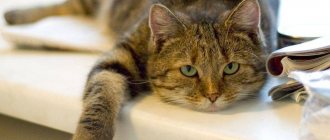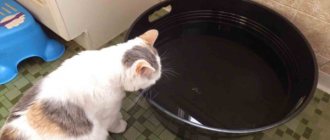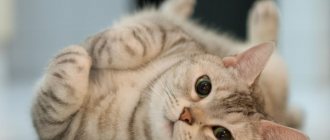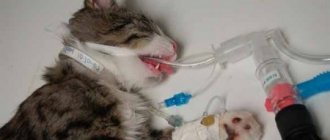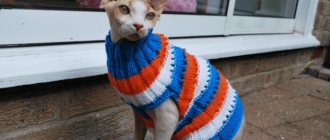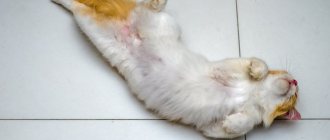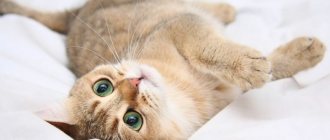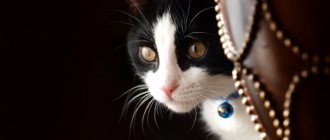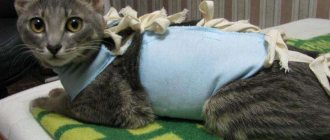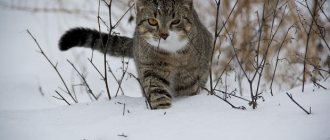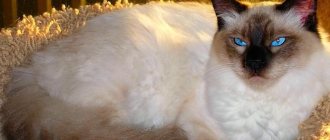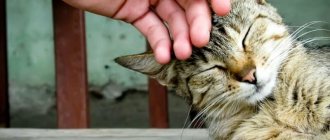Possible postoperative complications
If a cat does not eat or drink after surgery, this makes the owners worry, so the question arises of how to help their pet and whether this may indicate the presence of serious complications.
After sterilization, it takes time to recover
It is absolutely normal for a cat to eat poorly after sterilization or a cat after castration during the first 24 hours. All the animal does is sleep and sometimes get up to drink some water.
Important! If the animal cannot get up on its own to drink water, then it must be given water periodically.
In addition, there is no need to panic if the cat goes to the toilet under itself or vomits; this is also quite possible until the threads are removed from the seam. Veterinarians recommend that owners do not touch the cat during the first two days and, if it does not want to eat, there is no need to force food. The animal will be able to go without food for several days, while its body will use up previously accumulated calories to maintain satiety.
The postoperative period will be painful for the cat, but it will gradually recover. In addition, she will receive injections to maintain fluid balance.
The animal needs to be allocated a secluded corner that will be quiet and calm so that the cat can rest and get enough sleep. You should definitely put a bowl of fresh food nearby.
Note! If there are other animals in the house besides the cat, they must be isolated until the sterilized animal is completely restored.
If a cat does not eat or drink for several days after sterilization, then you should urgently seek veterinary help, because such a condition may indicate the development of serious diseases.
Postoperative complications may be as follows:
- development of sepsis;
- intestinal atony or obstruction;
- kidney or liver problems;
- hernia;
- inflammation of the peritoneum;
- infectious infection;
- suppuration of the sutures or their divergence.
Complications after surgery can vary
If at least one negative symptom appears, you must seek help from a specialist; treatment at home is unacceptable, because there is a threat to the pet’s life.
Wound care and treatment
Postoperative sutures usually do not cause discomfort to the animal. But curiosity takes over, so often the cats themselves become the culprits of unpleasant consequences. Therefore, you should not let your cat disturb the wounds. A little effort is also required from the owner to ensure that the animal endures the adaptation period after surgery as easily as possible.
Simple tips to help you heal quickly:
- Treat seams with brilliant green or hydrogen peroxide at least 2 times a day. As a supplement, you can use levomekol ointment; it is used as an antibacterial and healing agent.
- To prevent the animal from touching the surgical site, wear a special diaper.
- A five-day course of antibiotics to prevent infection.
Cats' bodies are very similar to humans, so provide them with care and attention. Even small wounds need to be treated, and even more so after surgery.
The appearance of pathogenic bacteria can only be avoided by treatment.
If all this is done, then in a short time the animal will begin to delight its owners with a wonderful mood.
Anesthesia is the cause of lack of appetite
Cat after sterilization: care at home
During surgery, veterinarians use general anesthesia as it helps numb the surgical site. Another advantage of anesthesia is that the cat will not escape from the operating table and will not inflict even greater injuries or mutilation on itself.
But the effect of anesthesia after the operation does not go away without a trace, and the cat recovers from it for a long time: it may take a long time to wake up, breathe heavily, eat nothing and move unsteadily - and all this is the norm.
In rare cases, an animal can be in a comatose state for a week: refuse to eat, sleep constantly and practically not move. But all this goes away over time without additional help.
If a cat does not drink water after anesthesia, then this is also quite normal, since it may vomit after drinking water or food. Therefore, you should be patient, and very soon your pet will recover.
Veterinarian advice when mammary glands are enlarged
The most common type of postoperative complication is altered mammary glands. If they swell immediately after surgery, it means the cat has a false pregnancy. If your pet’s glands are swollen, then this process began even before the operation, and removal of the ovaries did not stop their enlargement.
For breast enlargement, doctors recommend:
- Reduce the likelihood of stressful situations, after which the glands become enlarged.
- For the normal functioning of the glands, it is necessary to properly adjust the cat’s diet, minimizing dairy products and foods high in carbohydrates.
- Enlarged glands may go away on their own, but there is a possibility of mastitis.
What to do if the animal refuses to eat
Owners begin to worry if the cat does not eat after surgery, what to do in such a situation and why does this happen? In this case, you should consult a specialist, as complications may arise.
How long does it take for a cat to recover from anesthesia after sterilization: how you can help
The animal must be fed three times a day with kefir, broth or meat puree, but in small portions. This can be done using a syringe without a needle, pouring food carefully into the cheek. It is also recommended to place an intravenous drip with nutrition.
Important! If the cat does not eat anything or go to the toilet for a long time, it means that some complication could have developed.
It is very important to ensure that your cat goes to the toilet regularly, because constipation can cause her to refuse to eat. To determine whether the cause is really constipation, it is worth palpating the stomach and, if there are lumps, give an enema or give the animal a laxative.
Refusal to eat after surgery usually lasts several days
After the operation, the cat must be wearing a blanket, which prevents licking the wound and scratching it. The owner’s task in this case is to care for the wound, since its deterioration can also affect the animal’s complete lack of appetite.
If no complications were confirmed by the veterinarian, then after 10 days the pet will be able to fully recover and begin to eat normally.
Feeding after surgery
In order for your cat to recover quickly after surgery, you should monitor its diet. Proper nutrition is the key to a quick recovery and prevention of complications.
The cat does not drink water at all: what to do, why
During the first two days, the animal may not eat anything at all, and this is normal. During the first day, the cat should not be given solid food; it is better to cook broths or soups. On the second day, you should start feeding with soft food or crush the food into a puree. It is recommended to feed in small portions 3-4 times a day.
After surgery, the animal loses a lot of minerals and vitamins and it is very important to compensate for their deficiency in the body, so experts recommend buying special cat food that has high nutritional value and a balanced composition.
If the animal eats homemade food, then you should avoid foods with a strong smell and spices. It is also prohibited to give dry food during the postoperative period; it must be pre-soaked with water, but the main emphasis after the operation should be on eating canned meat and purees.
Important! When feeding your cat, you should make sure that the food is neither hot nor cold. It should be at a comfortable temperature for consumption.
Danger of dehydration
Water makes up 65% of a cat's total body weight. With its help, nutrients and oxygen are transported to the tissues of the body. If there is insufficient fluid supply, this process slows down, and the lack of oxygen leads to cell death and disruption of system function.
Dehydration leads to an increase in the concentration of toxic substances in the blood and urine, which negatively affects the functioning of the kidneys and liver. Without receiving the proper amount of moisture and oxygen, certain areas of the brain gradually begin to die, which is accompanied by nervous phenomena, loss of coordination, convulsions and paralysis.
Rules for feeding a sterilized cat
It is necessary to start feeding the cat only 12 hours after surgery, since during this time the animal’s gastrointestinal tract does not work well, and it may vomit after eating.
When compiling further menus, it is imperative to take into account how the animal ate before sterilization. The most acceptable are cat foods, since they contain balanced components necessary for a pet.
Food for a sterilized cat
- First day. A cat does not eat well after sterilization for 24 hours; this is normal. This is the period when the animal is completely exhausted and cannot show interest in food or water. You can give your cat water a few hours after the operation, but before that you can only moisten a little sponge or drop a couple of drops of water on the tongue to avoid dehydration.
- Second day. If there are no complications, the animal may begin to show interest in food, and it is worth feeding it with special cat food. You should choose those whose action is aimed at restoring the body after operations or illnesses. It is worth opting for canned food such as Royal Canin, Hill's, Purina, etc. But if before the operation the animal was home-fed, then it should be boiled chicken broth and add a little twisted meat.
- The third day. The cat should begin to eat on its own without any help. But if this is not observed, you should pay attention to the pet’s behavior. If she meows, there is an unpleasant odor coming from the stitches, or the wound is bleeding, then the animal should be immediately shown to a doctor.
- Fourth day. If the cat still does not eat anything, then this most likely means the presence of complications such as peritonitis, sepsis or problems with the gastrointestinal tract. If the cat ate normally for the first four days, and then suddenly began to refuse to eat, this may mean the occurrence of delayed intestinal atony or problems with the liver or kidneys. The fourth day without food after surgery may mean that the cat is dying, so you need to drop everything and run with it to the veterinary clinic.
- Fifth day. You can already start giving everything that the animal ate before surgery. But if during the first five days the cat took food reluctantly, and sometimes even refused it altogether, then it can lose a lot of weight, and in this case it is necessary to introduce high-quality food into the diet and take additional medications that are prescribed only by a veterinarian.
Many animals recover easily and quickly after surgery.
If the cat does not drink after sterilization or does not eat anything after two days, then you should seek help from a veterinarian, who will identify the complication in time and give further recommendations for treatment.
The cat does not eat or drink for a long time: the main reasons for refusing water and food
If the cat feels weak, does not touch food even for 2-3 days
If the cat feels weak and does not touch food even on the 2-3rd day, food is administered intravenously or fed with broth from a pipette.
In the postoperative period, it is recommended to give non-solid, easily digestible foods. If a cat has been eating dry industrial food, it is switched to soft food. Some animals' taste preferences change and they give up their favorite foods.
If the cat does not eat or drink for several days after surgery, this becomes an alarming signal. Sometimes hospitalization is recommended so that the animal is under medical supervision around the clock.
Cats are quite intelligent animals with a decent instinct for self-preservation. They will never eat everything in a row; they are extremely careful when choosing food. But there are times when the appetite completely disappears.
At first glance, it is difficult to determine why a cat has not eaten or drunk for several days. This may also be accompanied by additional symptoms - a serious reason to take emergency measures. You can determine the condition of your pet by its appetite.
Below we have given you a video example where a cat fell ill with distemper and stopped eating and drinking water. Look at the general condition of the cat, perhaps the symptoms may be similar!! In the video, the owner recommends the medications that the doctor prescribed for her. Be sure to consult a veterinarian!
According to veterinarians, temporary hunger strikes in animals are acceptable and not painful. These factors include:
- A kitten may not eat anything for one day. This rule applies to animals under 6 months of age. If he continues to refuse food, adequate measures must be taken.
- Healthy young pets can refuse food for 5 days. This “diet” is absolutely safe for the body, provided there are no obvious signs of illness. If your cat begins to burp, vomit, diarrhea, lose weight quickly, refuse fluids, or a week has passed since her hunger strike, immediately contact the veterinarian!
- An old cat may not eat for three days. A longer hunger strike indicates the development of chronic diseases. In this case, you can’t do without the help of a specialist.
There are other reasons that cause an animal to temporarily refuse food. Let's look at them in more detail in our article and find out why cats refuse food for several days and how to help them in this situation.
The beloved fold-eared pet with a good-natured face and a trusting look suddenly began to refuse his favorite treats. Atypical behavior for pets makes the owner nervous. Naturally, every caring owner tries to find out why a domestic kitten is not eating.
The worst thoughts immediately come to mind, and we intuitively run to specialists for help. However, there is no need to rush; it is necessary to exclude all possible reasons that could cause a change in the appetite of a furry family member.
Pets develop taste preferences over time. They quickly get used to their daily diet and do not always give in to experiments involving a sudden change in diet. If you have recently changed your pet’s usual food to a new composition, your cat may refuse to eat on principle, showing his dissatisfaction. Loss of appetite can also occur due to the introduction of new foods into the diet.
So, unfamiliar food is one of the reasons why a furry family member may go hungry for several days. If the food remains the same, look into your pet's bowl to see if there are leftovers from the previous meal or poorly washed edges.
A clean animal may refuse food after smelling the unpleasant smell of rotting remains. Take care of the hygiene of dishes for your pet. A dirty bowl can not only affect his appetite, but also provoke the development of certain diseases.
You feed it its usual food, thoroughly clean the bowl after each feeding, follow all the doctor’s recommendations, but the animal does not develop an appetite. The cat refuses to eat, and the cause of this condition may be stress or pain.
What is this connected with? There is no definite answer; you will have to draw your own conclusions. Stress in cats occurs for various reasons:
- moving to a new home;
- rearrangement of furniture in the house;
- replacing the usual dishes with another;
- the appearance of a new family member in the house, etc.
In such an environment, the cat can feel safe and eat. Be sure to provide her with something to drink. If she continues to refuse food for more than 3-5 days, contact your veterinarian. An experienced doctor will be able to determine the exact cause of the hunger strike and find a solution to this problem.
A domestic cat may not eat well if it has dental problems. This cause of loss of appetite is very common. A clear sign of pathology: the animal may drink a lot of liquid, choke on food, burp after eating solid food, etc. Loss of appetite occurs due to a lack of teeth in a row, which provokes the development of certain diseases of the gastrointestinal tract.
The source of such problems can also be dental caries, gum disease, tartar accumulation and other dental ailments typical of humans. To prevent such conditions and not to risk the health of a purebred cat, carry out hygienic care of its oral cavity in a timely manner. If you detect obvious signs of an inflammatory process, consult a doctor.
If dental disease has already caused loss of appetite in your beloved cat, try to choose the optimal set of foods for feeding. Eliminate solid foods, grind all food served, and be sure to consult your veterinarian. Your friend may need medication help.
You can understand that an animal has been poisoned if the cat refuses to eat for several days, which is also accompanied by a gag reflex, lethargy, muscle tremors and other unhealthy signs. Due to poisoning and painful symptoms, the cat may hide, meow loudly, or simply lie down without showing active signs of life. Any atypical symptoms should not be ignored.
Poisoning can be caused by various chemicals, low-quality products, medications, etc. A dangerous substance could enter the animal’s body accidentally or intentionally. A cat can swallow bait containing poison, which is possible if the pet has free access to the street.
| Video (click to play). |
The culprit of this process can also be the owner of a furry friend, who unintentionally fed the cat spoiled food or food containing components unsafe for the animal.
If the reason for refusing to eat is poisoning, it is necessary to take urgent measures to save the four-legged family member! An experienced veterinarian will prescribe effective treatment so that your pet can recover.
The main thing is not to hesitate, since in case of poisoning with chemical poisons, irreversible processes in the body can begin, which lead to the most unfavorable prognosis.
Poor appetite in a domestic cat may indicate the development of pathological processes in the liver, kidneys and urolithiasis, which often occurs due to poor quality nutrition. According to statistics, such diseases are diagnosed in felines three times more often than in dogs.
You can determine exactly what the problem is by the following symptoms:
- the cat behaves lethargically, the condition noticeably worsens;
- can drink large amounts of water at one time;
- there is an unpleasant odor from the mouth;
- frequent urge to urinate;
- there are blood impurities in the urine;
- vomit;
- convulsive conditions;
- elevated temperature;
- weight decreases;
- if you stick out your tongue, you will notice an uncharacteristic yellow coating;
- increased salivation;
- anemia and signs of dehydration.
With such symptoms, the animal must be urgently shown to a specialist!
Forecasts for the animal:
- Kidney diseases can be treated if promptly consulted by a veterinarian;
- if the disease is advanced, there is a possibility of becoming chronic, which will require regular support for the cat’s health to prolong and improve the quality of its life;
- With liver diseases, obesity is observed, which also negatively affects the general condition of the pet and shortens its lifespan.
Even if your cat is sick, do not rush to part with your furry friend. Provide her with the necessary help, provide care and love, because any disease can be treated, especially if you are next to her during this difficult period!
What to do if your domestic cat does not eat at all due to a foreign body entering the stomach:
- do not try to feed your pet (severe vomiting may occur);
- do not do an enema yourself (there is a risk of serious damage to the intestines);
- do not give your cat antiemetics or laxatives, as they will not solve the problem and will only worsen the general condition;
- Seek help from a qualified veterinarian as soon as possible!
Any foreign body can enter the animal's body, including indigestible sausage skins, scraps of wool and bones. This is a very dangerous condition for the animal, known as intestinal obstruction. If timely medical care is not provided, there is a high risk of death.
The death of a pet occurs due to the release of gastric juice and its stagnation in the intestines. An unfavorable process is accompanied by vomiting, the abdomen becomes enlarged, and when pressure is applied the cat experiences severe pain. Do not try to solve the problem yourself; any wrong action can lead to irreversible consequences.
